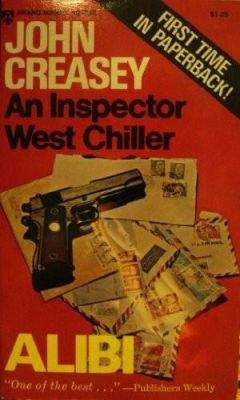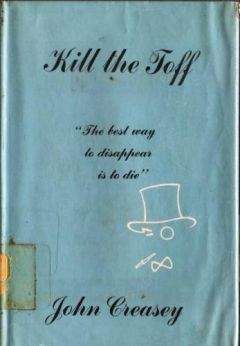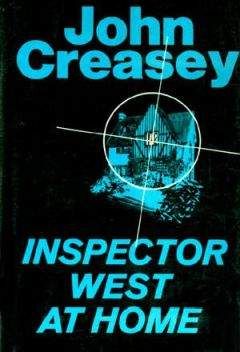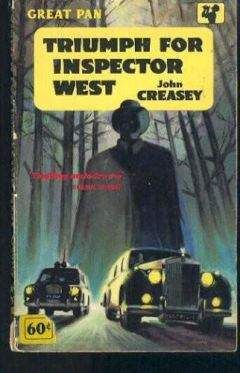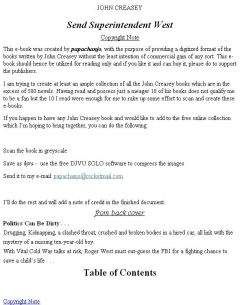John Creasey - Inspector West Alone
На сайте mybooks.club вы можете бесплатно читать книги онлайн без регистрации, включая John Creasey - Inspector West Alone. Жанр: Прочее издательство неизвестно,. Доступна полная версия книги с кратким содержанием для предварительного ознакомления, аннотацией (предисловием), рецензиями от других читателей и их экспертным мнением.
Кроме того, на сайте mybooks.club вы найдете множество новинок, которые стоит прочитать.
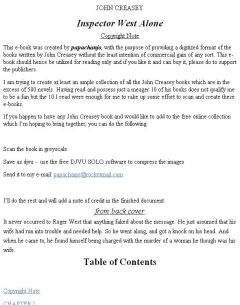
John Creasey - Inspector West Alone краткое содержание
Inspector West Alone читать онлайн бесплатно
There was a fortune in crime.
He washed, then started on the sandwiches—he was ravenous. Half-way through, the telephone bell rang. He had to get up to answer it. He seldom had calls, and they were always from Kennedy or Percy. He lifted the telephone, and was surprised that his own voice was harsh.
“Hallo?”
“Mr. Rayner?”
“Yes, speaking.”
The man at the other end hung up without another word —and left his voice ringing in Roger’s ears. The voice had been unmistakable: Bill Sloan had called.
Why to-night?
Why now?
* * * *
Roger picked up the Sunday newspapers. His own Times, Observer, and Express were there, together with Harry’s Sunday Cry. He’d seen his own, glanced through the Cry —and suddenly stopped breathing.
His photograph—the real West’s—looked up at him.
He scanned the article, saw a mention of Copse Cottage, and sat very still.
CHAPTER XVI
BULL-DOG
THE front-door bell rang.
Sloan couldn’t have reached here as quickly as that, even if he’d called from a kiosk nearby. Roger got up, and the bell rang again. He went to it slowly, not worrying about the caller’s impatience, searching for any weakness in his own alibi.
The bell started to ring again as he opened the door.
Kennedy said: “Getting lazy ? Like someone to replace Harry on his night off?” He came forward.
Roger barred his way.
“You choose the damnedest times for coming. When you’re wanted you’re not here, when you’re not wanted you find your way. Is Percy downstairs with the car?”
“No.” Kennedy stood on the threshold, too startled to protest, and worried for the second time since Roger had known him. “What’s wrong?”
“I’ve just had a call from Detective Inspector Sloan, and I fancy he’s on his way here. I don’t know why he chose to-night, and I hope the reason isn’t what I think it might be. If I were you, I’d go into the office, wait until he’s come into this room, and then leave.”
“I don’t think I like your friend Sloan,” said Kennedy in a soft voice. He glanced over his shoulder towards the stairs. There was no sound.
Roger said: “Forget it, Kennedy. I’ll tell you here and now there’s one thing I won’t lake. That’s violence against the police.”
“Won’t you?”
“No. Get into the office.”
“Did he say he was coming here?”
“No, that’s why I think he is. He telephoned. The D’s have taken off, I can’t think of anything that’s gone wrong, except you calling.” The whispered voices couldn’t travel far, but he wondered if Sloan were here and near enough to see the shadows on the top landing. “Have you an office key?”
“You like giving orders, don’t you? Watch yourself.”
Roger said: “Hurry.”
Kennedy crossed the landing and let himself into the office, making hardly a sound. Roger went back to the living-room, put the money and diamond into a drawer, locked it and pocketed the key, then went slowly downstairs. He peered into the dark corners of each landing and the passage; there was no trace of Sloan, and nowhere the Yard man could hide. He opened the door and went into the street and strolled up and down; two people turned into the street, but neither took any notice of him or turned into Number 15. Sloan hadn’t arrived yet. He withdrew into the doorway and heard a car turn the corner. Headlights blazed and shone on to Number 15, but he dodged back in time to avoid them, left the door unlocked, and went upstairs.
He put on all the lights and was eating another sandwich when the flat door-bell rang. He let it ring, as with Kennedy, but Sloan wasn’t so impatient and didn’t ring again. When Roger opened the door, Sloan stood back from it, head on one side, smiling with taut lips.
“Who——” began Roger.
“Remember me?” asked Sloan.
Roger relaxed. “Well, well, it’s the policeman who came to my house-warming! Don’t you rest on Sundays?”
“Policemen never have any time off.”
“Come in and relax,” said Roger. He wished the lights weren’t so bright; putting all on had been a mistake. It was easy to understand mistakes which crooks made, now, the list of possible slips was a mile long. He felt a tug of the tension he had experienced when Sloan had first come here, and when he had seen Janet and Mark.
Sloan looked round and tossed his hat into a chair.
“You do yourself well.”
“I’m a successful business man. Have a sandwich.”
“Thanks.” If Sloan had a weakness, it was for food. “You’re very affable to-night.”
“I’ve been enjoying myself,” Roger said, and grinned. “You like these unofficial visits, don’t you?”
“I never pay calls when I’m off duty, you can call me the man who’s always on the job.”
“What will you drink?” asked Roger.
“Beer, if there is any.”
“Other people besides policemen drink beer.” The conversation was too slick. Roger hadn’t any idea whether Sloan had come because of the Brixton job, but as his mind roamed restlessly about the possibility, he didn’t see where he could have slipped up. He poured beer into a glass tankard and had a gin for himself; gin, because as Roger West, he had never drunk it. He kept his voice hard and spoke with little movement of his lips; he was more afraid of his voice than of anything else, when with Sloan. “What do you want?” he asked.
“That’s a leading question. Been places to-night, do you say?”
“A nice little girl,” Roger said dreamily. “Sweet and innocent, no intelligence, no questions, a nice little healthy little pleasant little animal. They still grow like that. Suppose you tell me why you want to see me.”
“I hope you’re in a more talkative mood than the last time.”
“You’ve discovered all you want to know about me, haven’t you?”
“Not enough. I don’t know all your friends.”
“The Kennedy one?” Roger laughed.
“Wrong name, right initial. Remember Mr. Kyle?”
Roger said, “Kyle, Kyle?” He stood his ground, but wanted to sit down. “Kyle—oh, the little crook who came to see me just before you arrived that day. Yes, I remember.”
“You’ve a good memory. Heard from him lately?”
“No.”
“Surprising,” said Sloan, and grinned. “He carried a slip of paper round in his pocket, with a different name on it, care of the Strand G.P.O. When he was brought in last, that piece of paper turned up. I went and collected a letter addressed to the alias from the Post Office. There was nothing written inside, but there were ten pound notes. Are you a philanthropist?”
“Not yet.”
“Did you send that money to him?”
“No. Ask him.”
“Don’t you know what happens to your friends?”
“He wasn’t a friend of mine. He——”
“Friends of yours are liable to die suddenly, aren’t they? By accident?”
“So he’s dead!” said Roger, and frowned. “What do you expect me to do? Cry about a man I’ve only seen once in my life, and didn’t want to see again ?”
“What about the girl?”
Roger poured himself out another gin, refilled Sloan’s tankard, and hoped he was as casual as he ought to be. “I don’t follow? The girl I’ve just left——”
“No, not her. Marion Day.”
Sloan’s approach was puzzling. He was giving more away than a good policeman should. He had chosen to come on a Sunday night because it was the least likely time for a detective to call, and that was good tactics—but apart from that, he was being too clever.
Roger said slowly: “Marion Day ? No, it doesn’t ring a bell.”
Sloan laughed, spontaneously; there was nothing at all sinister about it.
“Ringing a bell is good.” He took a photograph from his pocket—of Marion. He thrust it forward under Roger’s nose. “Have a good look.”
Roger said : “I’ve seen her before, somewhere, but I don’t remember where, just now. I don’t know her well.”
“You will, if you ever join her,” said Sloan cryptically. “Either someone is storing up a lot of trouble for you, or you’re storing it up for yourself.” He came forward and looked hard into Roger’s eyes. “There was a telephone number with that alias of Kyle’s—Temple Bar 89511. Your office number. There was a telephone number in that girl’s handbag—T.B. 89511. Can you explain either?”
“Kyle, possibly because he’d been here, and might have wanted to try again. The girl——” Roger shook his head, but felt tension rising. “No, there’s no reason why she should have the number. There’s one thing you’ve probably overlooked.”
“What?”
“There are eleven people in my office. One of them might be involved—might be a friend of these people. I wouldn’t know.”
“I’ll find out,” said Sloan. “In fact I’m finding out, Rayner. These two people were killed by accident, if you believe the coroner, but I don’t always agree with inquest verdicts.” He finished his beer and took out cigarettes from a familiar yellow packet. Roger took one. “Remember the Copse Cottage murder?” Sloan asked, and his eyes were close to Roger’s above the flame of his lighter.
It wasn’t fair; the dice were loaded against Sloan. The slight pause, the nonchalance of manner, were preliminaries to a rapier thrust; strangers wouldn’t know, but Sloan had learned these very tricks from Roger.
“There are so many murders,” Roger said. “Copse Cottage—no. Well, vaguely. How long ago was it?”
Sloan said: “Say a couple of months.”
“Murderer still free?”
“Yes. A girl was battered to death. Her killer escaped, and that was quite a sensation, because he was kidnapped from the police, a gang was involved. You wouldn’t know anything about criminal gangs, would you?”
“Plenty. I read my newspapers.”
Sloan said harshly: “You’re just that much too clever. Ever used the name of Kennedy?”
“No.”
“Where did you get your money from to buy the business from Kennedy?” Sloan asked roughly.
Roger said: “I hypnotized him into letting me have it, and he didn’t have a chance. It wasn’t from anyone named Kennedy, anyhow, it was from Samuel Wiseman. I still don’t see where all this is getting, Mr. Policeman.”
Sloan shrugged and turned to pick up his tankard— danger flared again.
“This is just the preliminary stage, I’m making my man uneasy. What did you do before you bought this business?”
“I made a small fortune in Africa. People still can.”
That was in the records Kennedy had provided of his past.
“I’ll check that, too,” said Sloan. “When you were in Africa, or after you came back, did you ever have a visit from Chief Inspector West?”
CHAPTER XVII
CAUSE FOR ALARM
Roger had sensed a thrust coming and had his defences up. They weren’t strong enough to withstand that. He jerked his head up. Sloan grinned; Sloan had never seemed so sinister. Roger didn’t answer. Sloan moved towards him and put a hand on his shoulder and pressed hard; it was a familiar grip used when a policeman was going to charge a man, and enjoy doing it.
“So you did,” said Sloan.
Roger said: “No, I didn’t have a call from West.” He forced a laugh. “But that name startled me. I was reading an article about him in to-day’s Cry.” That was true enough, but was it a get out? Sloan looked disappointed, and took his hand away, but that didn’t mean that it was safe to breathe freely. “He disappeared, after—great Scott! The Copse Cottage murder!”
“Which you didn’t remember, although you read about it this afternoon.”
Roger said: “The article was about West, the murder was hardly mentioned. Another drink?”
“No, thanks. Sure you’ve never seen West?”
“He’s never called on me, you’re the first policeman I’ve met at close quarters.” Roger offered cigarettes, and Sloan took one and examined the tip thoughtfully. “I still don’t know what you’re getting at.”
Sloan said softly: “Roger West was a good friend of mine.”
“Was he?”
“That canard in the Cry isn’t worth the paper it’s written on. Oh, it doesn’t say anything openly, but it makes a pretty broad hint. West was a very good friend of mine. I think he was trapped and killed and his name smeared with muck, and I’ve just one job in my spare time—finding out the truth of that.”
“You’d better find the writer of that article.”
“I can find him whenever I want him,” said Sloan.
“Pity you can’t say the same about your friend.”
“Yes,” said Sloan heavily. “Listen to me, Rayner. I’ve spent a lot of time checking on your past and what you do. I haven’t found anything much against you. I’ll tell you something that I wouldn’t if I were here officially to-night. I like the cut of your jib. I don’t think you’re a bad ‘un, and I can smell bad ‘uns. You might be mixed up in something which you don’t know about. The man who owned this business wasn’t Wiseman, but a certain Mr. Kennedy. I think Kennedy can tell me something about
Roger said: “You get odd ideas, but I can’t speak for Kennedy. I dealt with Wiseman.”
“Please yourself,” said Sloan. He half-turned in preparation for another thrust. “Rayner, I’ve just come from West’s wife. She’s pathetic. She’s afraid that he’s dead, but she doesn’t know for certain. She’s frightened by things she can’t understand. She’s had a lot of that Cry muck poured into her, and it hurts her like hell. She knows what I know about West—there wasn’t a straighter man living. I’m going to scrape the mud off West’s name somehow. If you’re smeared with that mud, look out. If you’re not——”
Roger said: “I’m sorry for his wife.” He didn’t know how he got the words out, but Sloan didn’t seem to notice any oddness in the sound of his voice. Sloan might be foxing or, but more likely, had been carried away with his own emotions.
“All right,” Sloan said. “Tell your friend Kennedy what I’ve said.”
He went to the door. Roger let him out.
* * * *
Roger closed the door and went back to the sitting-room and saw nothing except the image of Janet’s face, superimposed on the memory of Sloan’s. His eyes stung, his hands were clammy. He sat down and leaned back in his chair and stared at the ceiling and at that image. It wasn’t a help to know that Sloan kept faith; nothing was a help.
Then he opened his eyes. The sight of sandwiches nauseated him. He poured himself out a strong whisky and soda.
It was a waste of time trying to guess how and why Sloan had so quickly connected Kyle, Marion, and Kennedy with him. He could see the build-up in Sloan’s mind; add to that Sloan’s tenacity, and in this case his burning desire to get at the truth, and it was all the explanation needed. By far the most important factor was the fact that Sloan had reason to suspect Kennedy.
Roger got up, took the money and the diamond out of the drawer and locked it in the small safe. Sloan had forced the pace. He himself had played cautiously for as long as he dared, and Kennedy was half-way to trusting him. He had never done a thing, since Kyle’s visit, to cause distrust. He was no longer followed everywhere, but in spite of that, he hadn’t put a foot wrong.
Похожие книги на "Inspector West Alone", John Creasey
John Creasey читать все книги автора по порядку
John Creasey - все книги автора в одном месте читать по порядку полные версии на сайте онлайн библиотеки mybooks.club.
